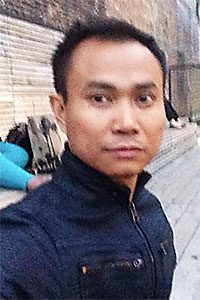
In the upcoming Feb 24 general election, one retired general does not need a big win if he wants to become prime minister. Under the current constitution, he just needs a small share of votes, 126 out of the 500 MP seats up for grabs. Yet, there have been an endless series of (presumably dirty) tricks and (shrewdly planted) traps to emerge over the past month which have been seen as efforts to help him gain this small win. Why?
For a military man, isn't it somewhat belittling to need all this help his rivals do not have for a fight that he could win without actually being the biggest winner? Doesn't it make him look like a weak and incapable contender?
And if his 2014 coup has not brought about the four years of "lost opportunities" that some politicians have criticised his administration for, then he could have been confident that the "hard work and dedication" that he has given the country will be rewarded in the form of votes.

Surasak Glahan is Deputy Editorial Pages Editor, Bangkok Post.
I'm aware that all you know that I'm talking about Prime Minister Gen Prayut Chan-o-cha whose prime ministerial candidature for the pro-regime Palang Pracharath Party (PPRP) is becoming ever more obvious as the days go by.
Predictably, he has denied most allegations about being behind the tricks (to help him and the PPRP secure their small win) and traps (to prevent rival parties from gaining a big or landslide victory). Unfortunately, few people believe him.
Just ahead of his meeting with some parties early this month, Gen Prayut stressed that every party needs to respect the rules ahead of the election. Yet he forgot, or pretended to forget, that one can respect the rules only if the rules are worth respecting. For now, politicians from parties which have no "pro-regime" stamp on them seem to be playing by the rules not because they respect them, but because they have no other choice. The same goes for many Thais who have endured this regime over the past four and a half years of lost opportunities.
One disrespectable rule is a provision in the constitution, drafted by people whom the regime recruited, that allows 250 senators, whom the regime will handpick, to join the Lower House in a vote for a prime minister after the election. First of all, this should not be the job of hand-picked senators. Secondly, the fact the rule maker is going to benefit from it makes it an unfair and unjustified rule.
With the vote from the Senate comfortably locked in for him, he will just need a 126 MPs to support his rise to power again. He could have just sat idly by, feeling thankful for the disreputable rule, while waiting until parties were allowed to begin campaigning to start wooing for the small portion of voters he would need. But he hasn't sat idly by.
A number of tricks to canvass votes have been engineered.
In past months, an endless string of "mobile cabinet meetings" have enabled him and his four (now PPRP affiliated) cabinet members to meet and greet local people in the provinces, while politicians from other camps were prohibited from doing so due to the political ban which was lifted on Tuesday. Tens of billions of baht has now been injected into those localities under the government's "Pracha Rat" scheme.
With the election just about two months away, his government should have had the courtesy to stop doing it. But it has done otherwise.
A budget of more than 86 billion baht has been set aside for cash handouts and subsidy programmes for the registered poor, farmers, the elderly and retirees in the past few weeks.
While he and his party have gained advantages by using state resources in their favour, they also have the Election Commission (EC) on their side. The poll agency has already declined to investigate claims that these schemes amount to little more than a thinly veiled attempt to canvass for votes in those regions.
It has also taken unnecessary and suspicious actions which were seen as the result of it complying with directives given by the regime. For instance, its redrawing of constituency boundaries in the 11 provinces which were the strongholds of the Pheu Thai and Democrat parties was seen as the gerrymandering to help PPRP gain an advantage in those areas. The EC's proposed new design for the ballot paper to omit parties' logos and names along with a regulation forbidding the display of photos of anyone other than MP candidates in campaign posters have also been seen as traps to keep certain other parties at a disadvantage.
What worries many of us even more is not just the action the EC has already taken, but what else it may do in lead-up to and following the election. For example, after the election there could be complaints made against certain candidates with the EC calling for their disqualification. How the EC will rule on such cases will thus be closely scrutinised.
All of this will make Thailand's Feb 24 election an event closely watched by foreign governments and the international community, no matter how much our government and the EC try to limit their ability to monitor the proceedings from within the country.
The fact that Gen Prayut needs only a minority of 126 MP seats to lead a new government already makes the poll a controversial contest. The tricks and traps that have allegedly been deployed to secure this small number of seats seem to imply that even for such an easy fight, his confidence of winning is not high.
Seven years after the last one, the prospects of having a fair election remain dim. Instead, we have witnessed a series of dubious acts designed to help a possibly not-so-strong contender gain the small win he needs.
